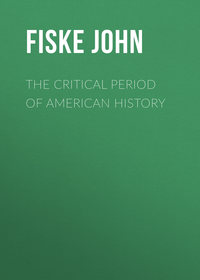 полная версия
полная версияThe American Revolution
It marks the inferiority of the mother-country to the colonies in political development, at that time, that the only solicitude as yet entertained by the British official mind, with regard to this measure, seems to have been concerned with the question how far the Americans would be willing to part with their money. With the Americans it was as far as possible from being a question of pounds, shillings, and pence; but this was by no means correctly understood in England. The good Shirley, although he had lived so long in Massachusetts, had thought that a revenue might be most easily and quietly raised by means of a stamp duty. Of all kinds of direct tax, none, perhaps, is less annoying. But the position taken by the Americans had little to do with mere convenience; it rested from the outset upon the deepest foundations of political justice, and from this foothold neither threatening nor coaxing could stir it.
Reply of the coloniesThe first deliberate action with reference to the proposed Stamp Act was taken in the Boston town meeting in May, 1764. In this memorable town meeting Samuel Adams drew up a series of resolutions, which contained the first formal and public denial of the right of Parliament to tax the colonies without their consent; and while these resolutions were adopted by the Massachusetts assembly, a circular letter was at the same time sent to all the other colonies, setting forth the need for concerted and harmonious action in respect of so grave a matter. In response, the assemblies of Connecticut, New York, Pennsylvania, Virginia, and South Carolina joined with Massachusetts in remonstrating against the proposed Stamp Act. All these memorials were remarkable for clearness of argument and simple dignity of language.
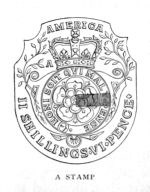
They all took their stand on the principle that, as free-born Englishmen, they could not rightfully be taxed by the House of Commons unless they were represented in that body. But the proviso was added, that if a letter from the secretary of state, coming in the king’s name, should be presented to the colonial assemblies, asking them to contribute something from their general resources to the needs of the British Empire, they would cheerfully, as heretofore, grant liberal sums of money, in token of their loyalty and of their interest in all that concerned the welfare of the mighty empire to which they belonged. These able and temperate memorials were sent to England; and in order to reinforce them by personal tact and address, Franklin went over to London as agent for the colony of Pennsylvania.
The Stamp ActThe alternative proposed by the colonies was virtually the same as the system of requisitions already in use, and the inefficiency of which, in securing a revenue, had been abundantly proved by the French war. Parliament therefore rejected it, and early in 1765 the Stamp Act was passed. It is worthy of remark that the idea that the Americans would resist its execution did not at once occur to Franklin. Acquiescence seemed to him, for the present, the only safe policy.

In writing to his friend Charles Thomson, he said that he could no more have hindered the passing of the Stamp Act than he could have hindered the sun’s setting. “That,” he says, “we could not do. But since it is down, my friend, and it may be long before it rises again, let us make as good a night of it as we can. We may still light candles. Frugality and industry will go a great way towards indemnifying us.” But Thomson, in his answer, with truer foresight, observed, “I much fear, instead of the candles you mentioned being lighted, you will hear of the works of darkness!” The news of the passage of the Stamp Act was greeted in America with a burst of indignation. In New York, the act was reprinted with a death’s-head upon it in place of the royal arms, and it was hawked about the streets under the title of “The Folly of England and the Ruin of America.” In Boston, the church-bells were tolled, and the flags on the shipping put at half-mast.
The Parson’s CauseBut formal defiance came first from Virginia. A year and a half before, a famous lawsuit, known as the “Parsons’ Cause,” had brought into public notice a young man who was destined to take high rank among modern orators. The lawsuit which made Patrick Henry’s reputation was one of the straws which showed how the stream of tendency in America was then strongly setting toward independence. Tobacco had not yet ceased to be a legal currency in Virginia, and by virtue of an old statute each clergyman of the Established Church was entitled to sixteen thousand pounds of tobacco as his yearly salary.
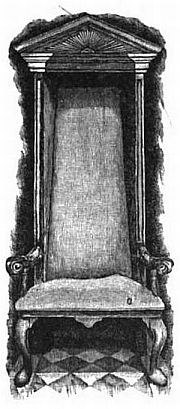
SPEAKER’S CHAIR, HOUSE OF BURGESSES
In 1755 and 1758, under the severe pressure of the French war, the assembly had passed relief acts, allowing all public dues, including the salaries of the clergy, to be paid either in kind or in money, at a fixed rate of twopence for a pound of tobacco. The policy of these acts was thoroughly unsound, as they involved a partial repudiation of debts; but the extreme distress of the community was pleaded in excuse, and every one, clergy as well as laymen, at first acquiesced in them. But in 1759 tobacco was worth sixpence per pound, and the clergy became dissatisfied. Their complaints reached the ears of Sherlock, the Bishop of London, and the act of 1758 was summarily vetoed by the king in council. The clergy brought suits to recover the unpaid portions of their salaries; in the test case of Rev. James Maury, the court decided the point of the law in their favour, on the ground of the royal veto, and nothing remained but to settle before a jury the amount of the damages. On this occasion, Henry appeared for the first time in court, and after a few timid and awkward sentences burst forth with an eloquent speech, in which he asserted the indefeasible right of Virginia to make laws for herself, and declared that in annulling a salutary ordinance at the request of a favoured class in the community “a king, from being the father of his people, degenerates into a tyrant, and forfeits all right to obedience.” Cries of “Treason!” were heard in the court room, but the jury immediately returned a verdict of one penny in damages, and Henry became the popular idol of Virginia. The clergy tried in vain to have him indicted for treason, alleging that his crime was hardly less heinous than that which had brought old Lord Lovat to the block. But the people of Louisa county replied, in 1765, by choosing him to represent them in the colonial assembly.
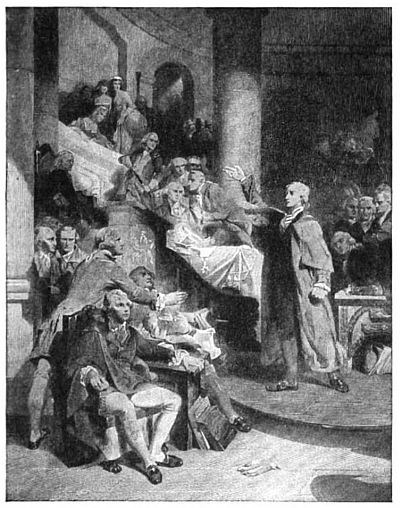
PATRICK HENRY MAKING HIS TARQUIN AND CÆSAR SPEECH
Patrick Henry’s resolutions
Hardly had Henry taken his seat in the assembly when the news of the Stamp Act arrived. In a committee of the whole house, he drew up a series of resolutions, declaring that the colonists were entitled to all the liberties and privileges of natural-born subjects, and that “the taxation of the people by themselves, or by persons chosen by themselves to represent them, … is the distinguishing characteristic of British freedom, without which the ancient constitution cannot exist.” It was further declared that any attempt to vest the power of taxation in any other body than the colonial assembly was a menace to British no less than to American freedom; that the people of Virginia were not bound to obey any law enacted in disregard of these fundamental principles; and that any one who should maintain the contrary should be regarded as a public enemy. It was in the lively debate which ensued upon these resolutions, that Henry uttered those memorable words commending the example of Tarquin and Cæsar and Charles I. to the attention of George III. Before the vote had been taken upon all the resolutions, Governor Fauquier dissolved the assembly; but the resolutions were printed in the newspapers, and hailed with approval all over the country.

See Transcription
The Stamp Act Congress
Meanwhile, the Massachusetts legislature, at the suggestion of Otis, had issued a circular letter to all the colonies, calling for a general congress, in order to concert measures of resistance to the Stamp Act. The first cordial response came from South Carolina, at the instance of Christopher Gadsden, a wealthy merchant of Charleston and a scholar learned in Oriental languages, a man of rare sagacity and most liberal spirit. On the 7th of October, the proposed congress assembled at New York, comprising delegates from Massachusetts, South Carolina, Pennsylvania, Rhode Island, Connecticut, Delaware, Maryland, New Jersey, and New York, in all nine colonies, which are here mentioned in the order of the dates at which they chose their delegates. In Virginia, the governor succeeded in preventing the meeting of the legislature, so that this great colony did not send delegates; and, for various reasons, New Hampshire, North Carolina, and Georgia were likewise unrepresented at the congress. But the sentiment of all the thirteen colonies was none the less unanimous, and those which did not attend lost no time in declaring their full concurrence with what was done at New York. At this memorable meeting, held under the very guns of the British fleet and hard by the headquarters of General Gage, the commander-in-chief of the regular forces in America, a series of resolutions were adopted, echoing the spirit of Patrick Henry’s resolves, though couched in language somewhat more conciliatory, and memorials were addressed to the king and to both Houses of Parliament. Of all the delegates present, Gadsden took the broadest ground, in behalf both of liberty and of united action among the colonies. He objected to sending petitions to Parliament, lest thereby its paramount authority should implicitly and unwittingly be acknowledged. “A confirmation of our essential and common rights as Englishmen,” said he, “may be pleaded from charters safely enough; but any further dependence on them may be fatal. We should stand upon the broad common ground of those natural rights that we all feel and know as men and as descendants of Englishmen. I wish the charters may not ensnare us at last, by drawing different colonies to act differently in this great cause. Whenever that is the case, all will be over with the whole. There ought to be no New England man, no New Yorker, known on the continent; but all of us Americans.” So thought and said this broad-minded South Carolinian.
Declaration of the Massachusetts assemblyWhile these things were going on at New York, the Massachusetts assembly, under the lead of Samuel Adams, who had just taken his seat in it, drew up a very able state paper, in which it was declared, among other things, that “the Stamp Act wholly cancels the very conditions upon which our ancestors, with much toil and blood and at their sole expense, settled this country and enlarged his majesty’s dominions. It tends to destroy that mutual confidence and affection, as well as that equality, which ought ever to subsist among all his majesty’s subjects in this wide and extended empire; and what is the worst of all evils, if his majesty’s American subjects are not to be governed according to the known and stated rules of the constitution, their minds may in time become disaffected.” This moderate and dignified statement was applauded by many in England and by others derided as the “raving of a parcel of wild enthusiasts,” but from the position here taken Massachusetts never afterward receded.
Resistance to the Stamp Act in BostonBut it was not only in these formal and decorous proceedings that the spirit of resistance was exhibited. The first announcement of the Stamp Act had called into existence a group of secret societies of workingmen known as “Sons of Liberty,” in allusion to a famous phrase in one of Colonel Barré’s speeches. These societies were solemnly pledged to resist the execution of the obnoxious law. On the 14th of August, the quiet town of Boston witnessed some extraordinary proceedings. At daybreak, the effigy of the stamp officer, Oliver, was seen hanging from a great elm-tree, while near it was suspended a boot, to represent the late prime minister, Lord Bute; and from the top of the boot-leg there issued a grotesque head, garnished with horns, to represent the devil. At nightfall the Sons of Liberty cut down these figures, and bore them on a bier through the streets until they reached King Street, where they demolished the frame of a house which was supposed to be erecting for a stamp office. Thence, carrying the beams of this frame to Fort Hill, where Oliver lived, they made a bonfire of them in front of his house, and in the bonfire they burned up the effigies.

Twelve days after, a mob sacked the splendid house of Chief Justice Hutchinson, threw his plate into the street, and destroyed the valuable library which he had been thirty years in collecting, and which contained many manuscripts, the loss of which was quite irreparable. As usual with mobs, the vengeance fell in the wrong place, for Hutchinson had done his best to prevent the passage of the Stamp Act. In most of the colonies, the stamp officers were compelled to resign their posts. Boxes of stamps arriving by ship were burned or thrown into the sea. Leading merchants agreed to import no more goods from England, and wealthy citizens set the example of dressing in homespun garments. Lawyers agreed to overlook the absence of the stamp on legal documents, while editors derisively issued their newspapers with a death’s-head in the place where the stamp was required to be put.
and in New YorkIn New York, the presence of the troops for a moment encouraged the lieutenant-governor, Colden, to take a bold stand in behalf of the law. He talked of firing upon the people, but was warned that if he did so he would be speedily hanged on a lamp-post, like Captain Porteous of Edinburgh. A torchlight procession, carrying images of Colden and of the devil, broke into the governor’s coach-house, and, seizing his best chariot, paraded it about town with the images upon it, and finally burned up chariot and images on the Bowling Green, in full sight of Colden and the garrison, who looked on from the Battery, speechless with rage, but afraid to interfere. Gage did not dare to have the troops used, for fear of bringing on a civil war; and the next day the discomfited Colden was obliged to surrender all the stamps to the common council of New York, by whom they were at once locked up in the City Hall.
Nothing more was needed to prove the impossibility of carrying the Stamp Act into effect. An act which could be thus rudely defied under the very eyes of the commander-in-chief plainly could never be enforced without a war. But nobody wanted a war, and the matter began to be reconsidered in England. In July, the Grenville ministry had gone out of office, and the Marquis of Rockingham was now prime minister, while Conway, who had been one of the most energetic opponents of the Stamp Act, was secretary of state for the colonies. The new ministry would perhaps have been glad to let the question of taxing America remain in abeyance, but that was no longer possible.
Debate in the House of CommonsThe debate on the proposed repeal of the Stamp Act was one of the keenest that has ever been heard in the House of Commons. Grenville and his friends, now in opposition, maintained in all sincerity that no demand could ever be more just, or more honourably intended, than that which had lately been made upon the Americans. Of the honest conviction of Grenville and his supporters that they were entirely in the right, and that the Americans were governed by purely sordid and vulgar motives in resisting the Stamp Act, there cannot be the slightest doubt. To refute this gross misconception of the American position, Pitt hastened from a sick-bed to the House of Commons, and delivered those speeches in which he avowed that he rejoiced in the resistance of the Americans, and declared that, had they submitted tamely to the measures of Grenville, they would have shown themselves only fit to be slaves. He pointed out distinctly that the Americans were upholding those eternal principles of political justice which should be to all Englishmen most dear, and that a victory over the colonies would be of ill-omen for English liberty, whether in the Old World or in the New. Beware, he said, how you persist in this ill-considered policy. “In such a cause your success would be hazardous. America, if she fell, would fall like the strong man with his arms around the pillars of the Constitution.” There could be no sounder political philosophy than was contained in these burning sentences of Pitt. From all the history of the European world since the later days of the Roman Republic, there is no more important lesson to be learned than this, – that it is impossible for a free people to govern a dependent people despotically without endangering its own freedom. Pitt therefore urged that the Stamp Act should instantly be repealed, and that the reason for the repeal should be explicitly stated to be because the act “was founded on an erroneous principle.” At the same time he recommended the passage of a Declaratory Act, in which the sovereign authority of Parliament over the colonies should be strongly asserted with respect to everything except direct taxation. Similar views were set forth in the House of Lords, with great learning and ability, by Lord Camden; but he was vehemently opposed by Lord Mansfield, and when the question came to a decision, the only peers who supported Camden were Lords Shelburne, Cornwallis, Paulet, and Torrington.
Repeal of the Stamp ActThe result finally reached was the unconditional repeal of the Stamp Act, and the simultaneous passage of a Declaratory Act, in which the views of Pitt and Camden were ignored and Parliament asserted its right to make laws binding on the colonies “in all cases whatsoever.” By the people of London the repeal was received with enthusiastic delight, and Pitt and Conway, as they appeared on the street, were loudly cheered, while Grenville was greeted with a storm of hisses. In America the effect of the news was electric. There were bonfires in every town, while addresses of thanks to the king were voted in all the legislatures. Little heed was paid to the Declaratory Act, which was regarded merely as an artifice for saving the pride of the British government. There was a unanimous outburst of loyalty all over the country, and never did the people seem less in a mood for rebellion than at that moment.
The quarrel had now been made up. On the question of principle, the British had the last word. The government had got out of its dilemma remarkably well, and the plain and obvious course for British statesmanship was not to allow another such direct issue to come up between the colonies and the mother-country. To force on another such issue while the memory of this one was fresh in everybody’s mind was sheer madness. To raise the question wantonly, as Charles Townshend did in the course of the very next year, was one of those blunders that are worse than crimes.
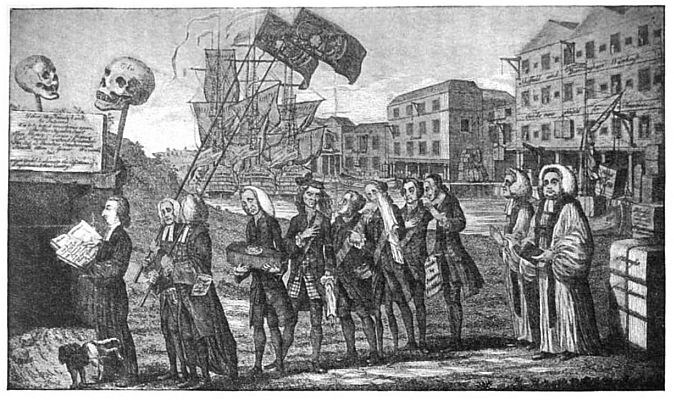
FUNERAL PROCESSION OF THE STAMP ACT
In July, 1766, – less than six months after the repeal of the Stamp Act, – the Rockingham ministry fell, and the formation of a new ministry was entrusted to Pitt, the man who best appreciated the value of the American colonies. But the state of Pitt’s health was not such as to warrant his taking upon himself the arduous duties of prime minister. He took the great seal, and, accepting the earldom of Chatham, passed into the House of Lords.
The Duke of Grafton’s ministry
The Duke of Grafton became prime minister, under Pitt’s guidance; Conway and Lord Shelburne were secretaries of state, and Camden became Lord Chancellor, – all three of them warm friends of America, and adopting the extreme American view of the constitutional questions lately at issue; and along with these was Charles Townshend, the evil spirit of the administration, as chancellor of the exchequer. From such a ministry, it might at first sight seem strange that a fresh quarrel with America should have proceeded. But Chatham’s illness soon overpowered him, so that he was kept at home suffering excruciating pain, and could neither guide nor even pay due attention to the proceedings of his colleagues. Of the rest of the ministry, only Conway and Townshend were in the House of Commons, where the real direction of affairs rested; and when Lord Chatham was out of the way, as the Duke of Grafton counted for nothing, the strongest man in the cabinet was unquestionably Townshend. Now when an act for raising an American revenue was proposed by Townshend, a prejudice against it was sure to be excited at once, simply because every American knew well what Townshend’s views were. It would have been difficult for such a man even to assume a conciliatory attitude without having his motives suspected; and if the question with Great Britain had been simply that of raising a revenue on statesmanlike principles, it would have been well to entrust the business to some one like Lord Shelburne, in whom the Americans had confidence.

In 1767, Townshend ventured to do what in any English ministry of the present day would be impossible. In flat opposition to the policy of Chatham and the rest of his colleagues, trusting in the favour of the king and in his own ability to coax or browbeat the House of Commons, he brought in a series of new measures for taxing America. “I expect to be dismissed for my pains,” he said in the House, with flippant defiance; and indeed he came very near it. As soon as he heard what was going on, Chatham mustered up strength enough to go to London and insist upon Townshend’s dismissal. But Lord North was the only person that could be thought of to take Townshend’s place, and Lord North, who never liked to offend the king, declined the appointment. Before Chatham could devise a way out of his quandary, his malady again laid him prostrate, and Townshend was not only not turned out, but was left practically supreme in the cabinet. The new measures for taxing America were soon passed. In the debates on the Stamp Act, it had been argued that while Parliament had no right to impose a direct tax upon the Americans, it might still properly regulate American trade by port duties. The distinction had been insisted upon by Pitt, and had been virtually acknowledged by the Americans; who had from time to time submitted to acts of Parliament imposing duties upon merchandise imported into the colonies.
The Townshend ActsNay, more, when charged with inconsistency for submitting to such acts while resisting the Stamp Act, several leading Americans had explicitly adopted the distinction between internal and external taxation, and declared themselves ready to submit to the latter while determined to resist the former. Townshend was now ready, as he declared, to take them at their word. By way of doing so, he began by laughing to scorn the distinction between internal and external taxation, and declaring that Parliament possessed the undoubted right of taxing the Americans without their own consent; but since objections had been raised to a direct tax, he was willing to resort to port duties, – a measure to which the Americans were logically bound to assent. Duties were accordingly imposed on wine, oil, and fruits, if carried directly to America from Spain or Portugal; on glass, paper, lead, and painters’ colours; and lastly on tea. The revenue to be derived from these duties was to be devoted to paying a fixed salary to the royal governors and to the justices appointed at the king’s pleasure. The Crown was also empowered to create a general civil list in every colony, and to grant salaries and pensions at its arbitrary will. A board of revenue commissioners for the whole country was to be established at Boston, armed with extraordinary powers; and general writs of assistance were expressly legalized and permitted.


